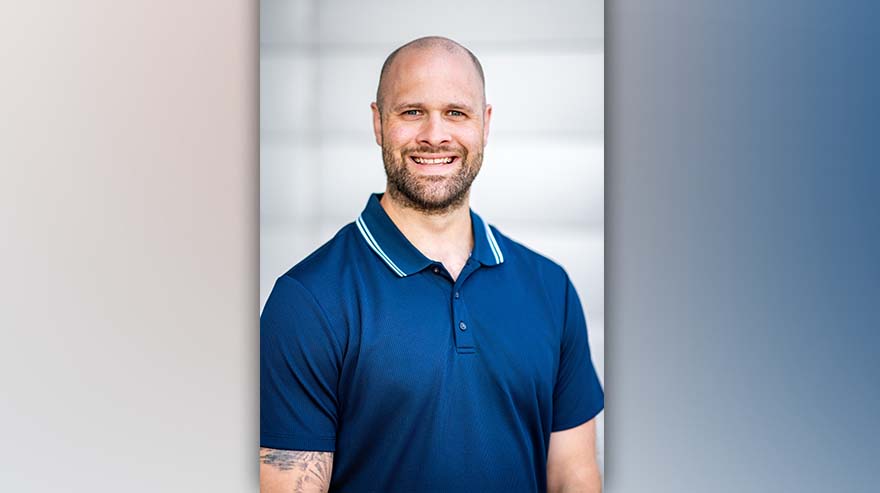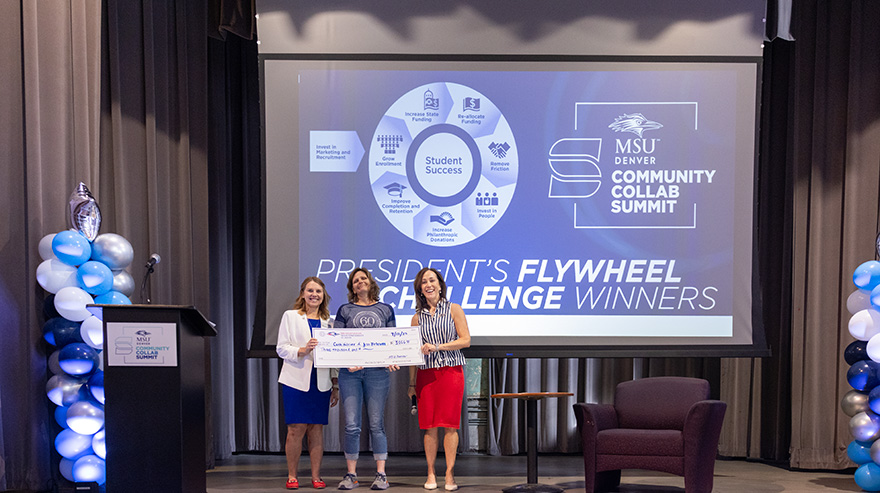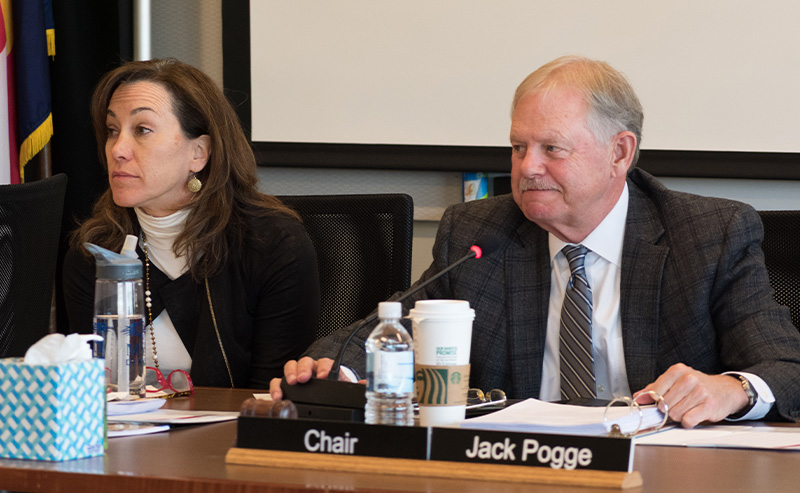Any Roadrunners still looking for a New Year’s resolution, or perhaps a mental mantra to help guide the semester, might consider two simple words: pace and grace.
They’re the guiding principles President Janine Davidson, Ph.D., is using to keep herself focused through 2024, a year that is already showing promise and plenty of reason for optimism. Keeping pace in mind will allow the University to focus on current and future goals, while cultivating an environment and culture of grace will ensure that people have the space and resources they need to thrive, Davidson said.
These two words also set the tone for Thursday’s Spring Update, where Davidson and Metropolitan State University of Denver leaders addressed employees with enthusiasm, honesty, humility and levity about areas of celebration, big projects ahead and challenges that the University is prepared to meet head-on.
Good news on enrollment and fundraising
The MSU Denver flywheel is gaining momentum. As of Jan. 31, spring full-time undergraduate enrollment is up nearly 4% over last spring, marking the largest enrollment growth since 2013. See more enrollment details in the President’s Cabinet meeting recap.
Davidson attributed the progress to a laser focus on student success, recruitment and fundraising, which has begun turning the flywheel to drive the University’s 2030 Strategic Plan. University Advancement has raised $55 million toward the University’s first-ever capital campaign over the past 2½ years, engaging a record of more than 2,300 alumni donors and helping to raise the University’s endowment from $7 million in 2017 to $27 million in 2024.
Davidson also applauded faculty members and the Office of Sponsored Research and Programs for making strides in grant funding. And she gave a shoutout to trustees and members of the legislative team for advocating for consistent, equitable increases in state funding.
While the University is feeling fiscal pressure from inflation and increasing core minimum costs, leaders remain committed to completing capital-improvement projects to further develop the Classroom to Career Hub and Health Institute and to implement a modern student-information system.
Davidson acknowledged the hard work ahead to bring these goals and projects to fruition and directly addressed challenges that have slowed the University’s pace and require a mindset of grace: Workday, workload, work-study and work-life balance.
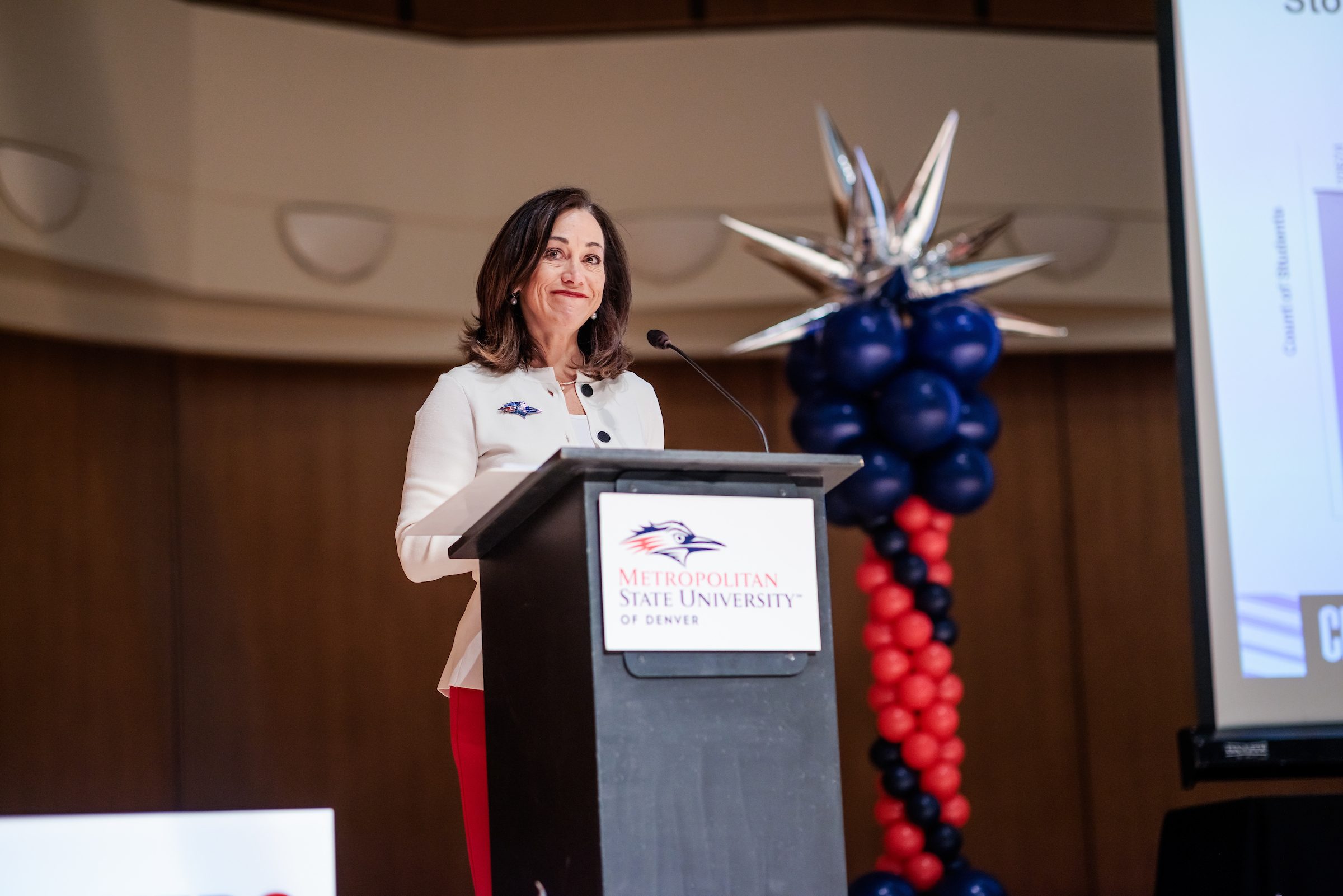
“We are facing these challenges, together, head-on and are fine-tuning our route,” said Davidson.
Davidson also emphasized that senior leaders have been scrutinizing results from the recent employee-engagement survey, responding to feedback regarding communication, connection, recognition, shared governance and alignment.
“MSU Denver should be a place of joy as well as purpose,” Davidson said.
New provost arrives on campus
Key to helping address MSU Denver’s challenges is Laura Niesen de Abruña, Ph.D., the University’s new provost. Niesen de Abruña took the stage to introduce herself to the University community, sharing her passion for equity and increasing education access for all students. She also spoke to the “seismic shift” in higher education as institutions have moved toward a student-centered philosophy and the historical organizational structure of universities in which faculty members were both educators and administrators. As universities have become more complex, however, professional administrative roles have developed, along with the need for shared governance and decision-making.
“When we’re talking about shared governance, we’re actually talking about that spirit that is embedded in the history of higher education,” Niesen de Abruña said. “Faculty are never simply employees. Students are never simply customers.”
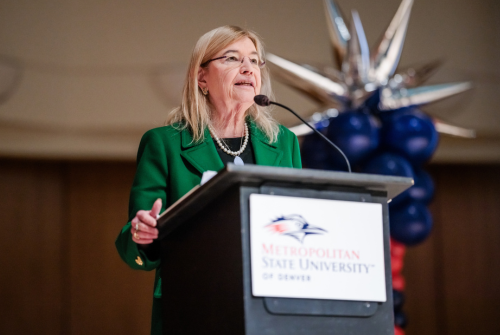
Strategic Plan progress
Pace and grace also infused a panel discussion on operationalizing and implementing the 2030 Strategic Plan. Meredith Jeffers, Ph.D., director of Strategy, invited Roadrunners to follow progress on the objectives and key results dashboard, also known as the “Rowdy Dash.” There, they’ll see data on efforts led by Marie Mora, Ph.D., deputy provost, and Will Simpkins, Ed.D., vice president for Student Affairs, who together with members of seven interdisciplinary working groups are advancing Pillars I and II, balancing student success with faculty success by strategically removing obstacles and maximizing tools and resources.
Kaycee Gerhart, vice president of Government and External Affairs, updated attendees on how the University strategically selected its capital projects in alignment with state workforce needs and priorities, while Michael Benitez, Ph.D., vice president for Diversity and Inclusion, touted the DEI Faculty Fellows initiative and Roadrunner Faculty Academy as well as the work of the DEI Council, noting that faculty members of color now represent 38% of tenure-track faculty.
Larry Sampler, vice president for Administration, spoke to the necessity of implementing a new enterprise resource planning tool and what he would have done differently with regard to resources, training and preparations. He noted that many of the antiquated paper-based systems that the University sought to improve with Workday (and not necessarily the tool) were a source of complication and frustration, saying that in some administrative-management aspects the University was being run as a “mom-and-pop business.” However, he did not shy away from his responsibility for the launch.
Sampler looks forward to the culmination of the Workday After Action Review, when the University will have had even more time to make data- and employee-feedback-informed improvements to Workday processes and integrations. The findings from this review will also help with future software updates, upgrades and rollouts. “I hope that Workday is going to be running the University in a way that is efficient, effective and even appreciated,” he said.




